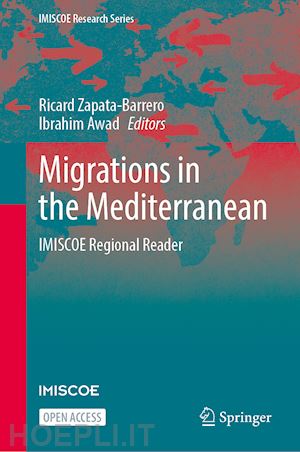
Questo prodotto usufruisce delle SPEDIZIONI GRATIS
selezionando l'opzione Corriere Veloce in fase di ordine.
Pagabile anche con Carta della cultura giovani e del merito, 18App Bonus Cultura e Carta del Docente
This open access Regional Reader describes population movement circulating within the Mediterranean area, for any reason or from any region, be them European, African, Asian or originating from any of the Mediterranean shores. It showcases a plurality of approaches to and applications of Mediterranean migration, contributing to a regional approach to migration studies, thereby defending this regional approach by scaling Mediterranean migration issues.
This book covers a large set of questions related Mediterranean migrations to the migration research agenda, such as: market and economy, politics and policies, super-diversity and intersectionality, media, society, welfare and the environment through five main parts: Geo-political Mediterranean Relations, Governance, Policies and Politics, Mobility drivers and Agency, Cities, History and Social Transformations, and Economy and Labour Markets.
This Regional Reader provides an interesting read to scholars, researchers, but also policy makers and civil society organizations’ high representatives, international foundations and institutions interested in linking the Mediterranean and migration.Chapter 1. Introduction: Mediterranean Migration Studies: a research agenda for the coming years.- Part I: Geo-political Mediterranean Relations.- Chapter 2. Looking at the EU-Turkey Deal: The Implications for Migrants in Greece and Turkey.- Chapter 3. Hindering democracy through migration policies? An analysis of EU external migration policies impacts on the democratization of Morocco.- Chapter 4. Migration across the Mediterranean: Shaping Italy-Libya relations over time.- Chapter 5. (Im-)Mobility Partnerships: Challenges to EU Democracy Promotion through Mobility in the Mediterranean.- Chapter 6. The migration initiatives encouraged by the Local and Regional Networks and their effects in the Euromed cooperation.- Part II: Governance, Politics and Policies.- Chapter 7. Migrants and Refugees in the Mediterranean Cities: Reception, regulation and actors. Tunisia case study.- Chapter 8. Media, Public Opinion and Migration Policies in Euro-Mediterranean Countries: The Case of France.-Chapter 9. Gendered Asylum in the Black Mediterranean: Two Nigerian Women’s Experiences of Reception in Italy.- Chapter 10. Activists Escaping Lebanon: Disruption, Burnout, and Disengagement.- Chapter 11. Ecologies of exclusion and inclusion in the Mediterranean: Seeking refuge in Lebanon.- Part III: Taxonomies of Motion and Drivers.- Chapter 12. Root Causes of Irregular Migration in the Eastern Mediterranean: The Case of Afghans and Syrians.- Chapter 13. Mobilities Among Marginalized Youth in Morocco: Precariousness, Agency and Networks.- Chapter 14. The continuity of migration drivers: A historical perspective on Spanish social transformations.- Chapter 15.: Capturing Irregular Migrations through a Macro-Sociological Lens: The harga process in twelve steps from North Africa to Europe.- Part IV: History, Cities and Social Transformations.- Chapter 16. Connecting places, connecting to place: the use of ICTs for imagining, narrating and exploring the Mediterranean city.- Chapter 17. The fenced off cities of Ceuta and Melilla: Mediterranean nodes of migrant (im)mobility.- Chapter 18. Mediterranean migrations and cities with their cultural histories and imaginaries: the case of Marseille.- Chapter 19. Infrastructure development and environmental change – a case study of forced (im)mobility in Mhamid oasis (Southern Morocco).- Part V: Economy and Labor Markets.- Chapter 20. The Political Economy of Egyptian Migration to Europe in the 2020s.- Chapter 21. The institutional channeling of transnational economic mobilization in three Moroccan regions.- Chapter 22. ‘No man’s land’: Reflecting on and theorizing migrant labour in the Mediterranean agriculture.- Chapter 23. Transnational Migrant Entrepreneurship Policies in the Maghreb Countries: Tunisia, Algeria, and Morocco.- Chapter 24. Concluding remarks: Applying Med-Thinking proviso to set a research agenda on Mediterranean migrations.
Ricard Zapata-Barrero is full Professor in the Department of Political and Social Sciences, Universitat Pompeu Fabra (UPF-Barcelona, Spain). His main lines of research deal with contemporary issues of liberal democracy in contexts of diversity, especially the relationship between democracy, citizenship, and immigration. He conducts theoretical and empirical research on migration and in the Mediterranean area. He is the Director of GRITIM-UPF (Interdisciplinary Research Group on Immigration), and of the Master’s Program in Migration Studies at UPF.
Ibrahim Awad is Professor of Global Affairs and Director, Center for Migration and Refugee Studies, School of Global Affairs and Public Policy, at the American University in Cairo, Egypt. He is Chair of the Global Knowledge Partnership on Migration and Development (KNOMAD), hosted by the World Bank, Chair of the Steering Committee of the Euro-Mediterranean Research Network on International Migration (EuroMedMig) and Senior Fellow at the Migration Policy Centre (MPC) of the Graduate Institute of International and Development Studies in Geneva, Switzerland.










Il sito utilizza cookie ed altri strumenti di tracciamento che raccolgono informazioni dal dispositivo dell’utente. Oltre ai cookie tecnici ed analitici aggregati, strettamente necessari per il funzionamento di questo sito web, previo consenso dell’utente possono essere installati cookie di profilazione e marketing e cookie dei social media. Cliccando su “Accetto tutti i cookie” saranno attivate tutte le categorie di cookie. Per accettare solo deterninate categorie di cookie, cliccare invece su “Impostazioni cookie”. Chiudendo il banner o continuando a navigare saranno installati solo cookie tecnici. Per maggiori dettagli, consultare la Cookie Policy.